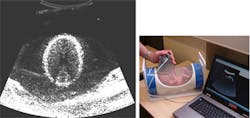UK engineers develop low-cost ultrasound system
A low-cost scanner that can be plugged into any computer or laptop to reveal vital information about an unborn child has been developed by engineers at Newcastle University (Newcastle, UK).
The hand-held USB device -- which is roughly the size of a computer mouse -- works in a similar way to existing ultrasound scanners, using pulses of high frequency sound to build up a picture of the unborn child on a computer screen.
However, unlike the technology used in most hospitals across the UK costing anywhere from £20,000-£100,000, the scanner created by Jeff Neasham and research associate Dave Graham at Newcastle University can be manufactured for as little as £30-40.
Tested by researchers in the Regional Medical Physics Department at the Freeman Hospital, part of the Newcastle upon Tyne Hospitals NHS Foundation Trust, the scanner produces an output power that is 10-100 times lower than conventional hospital ultrasounds.
It is now hoped the device will be used to provide medical teams working in the world's poorest nations with basic, antenatal information that could save the lives of hundreds of thousands of women and children.
The development of the scanner was funded through an Engineering and Physical Sciences Research Council (EPSRC) Knowledge Transfer Account (KTA) and a Proof of Concept loan from NorthStar Ventures.
Neasham says the beauty of the scanner is that it complements, rather than replaces, the high performance scanners available in hospitals.
The university is now seeking collaborative and/or license opportunities with a suitable industrial partner who can help commercialize the technology.
More information about the system is available here.
Recent articles from Vision Systems Design on ultrasound imaging that you might also be interested in.
1. 3-D ultrasound software company spins out of Oxford
University of Oxford (Oxford, UK) spin-out Intelligent Ultrasound (Oxford, UK) has raised £610,000 to develop software that can reduce the risk of incorrect or missed diagnoses from ultrasound scans and avoid costly, inconvenient rescans.
2. Ultrasound probe to monitor the vision of astronauts
Scientists at GE Global Research (Niskayuna, NY, USA) are involved in a three-year project to build and test a new ultrasound probe that could eventually be used to monitor how spaceflight affects the vision of astronauts.
3. Ultrasound propels nondestructive testing
Researchers at the Fraunhofer Institute for Industrial Mathematics (ITWM; Kaiserslautern, Germany) have now developed a mobile mechanized ultrasound system that can be used for the nondestructive testing of complex components.
-- Dave Wilson, Senior Editor, Vision Systems Design
